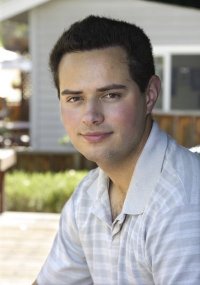Victor Quintanar-Zilinskas: Difference between revisions
From Santa Fe Institute Events Wiki
No edit summary |
No edit summary |
||
| Line 1: | Line 1: | ||
[[File:V Quintanar Z.jpg | [[File:V Quintanar Z.jpg|thumb|Victor]] | ||
'''Victor Quintanar-Zilinskas''' is a graduate student at the [http://en.wikipedia.org/wiki/University_of_California,_Irvine University of California, Irvine]. His current research focus is the emergence of interesting information processing outcomes from many-neuron (on the order of 1000's) networks. | '''Victor Quintanar-Zilinskas''' is a graduate student at the [http://en.wikipedia.org/wiki/University_of_California,_Irvine University of California, Irvine]. His current research focus is the emergence of interesting information processing outcomes from many-neuron (on the order of 1000's) networks. | ||
Revision as of 09:31, 11 March 2011

Victor Quintanar-Zilinskas is a graduate student at the University of California, Irvine. His current research focus is the emergence of interesting information processing outcomes from many-neuron (on the order of 1000's) networks.
He was raised in Palo Alto, CA and his interests and outlooks are heavily influenced by his upbringing in Silicon Valley's technoculture. He double-majored in math and biology at Santa Clara University (class of 2009). His undergraduate research in computational neuroscience engendered interest in the area that is now his current research program. He also worked with Geoffrey Bowker (who was, at the time, at Santa Clara University) to characterize the work practices of scholar communities that study complex systems (e.g. networks of ecologists that study various facets of the same ecosystem) and explain them in the context of the historical trajectory of scientific understanding of the systems under study. This work led to the development of the following framework (which will be appreciated by but unsurprising to this page's SFI-affiliated readers) for understanding the work practices in complex-system-centered scholarly communities: the increasing temporal resolution of data is encouraging a shift in the science of these systems from the (well-plowed) study of system processes to the explanation of salient events (e.g. shifts in the stable states of the composition of a local ocean bacteria population; large storms). Victor's current "applied philosophy" interest is the connections between Constructivism epistemology and creativity theory, and the philosophies of complexity and interdisciplinarity.
